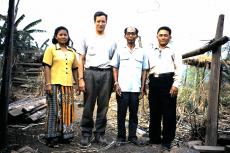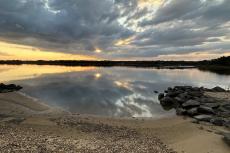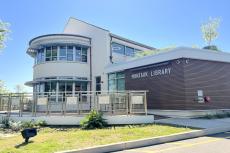The Suffolk County Legislature closed a public hearing on the county's Shellfish Aquaculture Lease Program on Feb. 2, with some legislators expressing weariness and irritation at residents pressing for tighter restrictions on the program, and sympathy for oyster farmers who described their nascent industry as under attack from recreational users of Peconic and Gardiner's Bays.
Under the program, 10-acre parcels are leased for private commercial shellfish farming. A review every 10 years, to determine if and how the program, known as SCALP, should be changed in future, includes an overall evaluation of it to date. The Suffolk County Department of Economic Development and Planning has conducted the initial review over the last two years, with input from the program's 10-Year Review Advisory Group, government officials, experts, bay user groups, and the public.
The review is now nearing conclusion, with a possible vote on an amended charter authorizing the program, and guidelines for its implementation, at the county legislature's March 2 meeting.
As filter-feeding bivalves, oysters help remove excess nitrogen from the water, and proponents of shellfish cultivation argue that the practice is important in mitigating conditions that promote harmful algal blooms. The leasing of bottomlands has proven controversial on the North and South Forks, however, with recreational boaters, including officials and members of yacht clubs, claiming that floating oyster cages pose a navigational hazard. The clubs have pressed for fewer lease sites and restrictions on the use of floating gear.
Around 30 stakeholders called in to the hearing, a majority -- many of them oyster farmers -- urging legislators to conclude the review without further reductions in cultivation zones or restrictions on gear.
Of some 100,000 acres of bottomland New York State ceded to the county in 2004 for the aquaculture lease program, "the cultivation zone that we currently have is almost 30,000 acres," Legislator Tom Cilmi said. "The revision to the program we're hopefully going to be voting on reduces that cultivation zone to 17,000 acres," a 43-percent reduction.
Just three or four lease sites have used floating gear in the program's first 12 years, some callers noted, with "zero conflicts on the one-half of one percent of the estuary using floating gear," said Will Peckham of West Robins Oyster Company of Southampton.
John Aldred, an East Hampton Town Trustee and one of the town's repre-sentatives to the review committee, noted that "the area originally chosen for leases in East Hampton contained 22 sites. That was reduced to nine sites . . . and it's now been reduced to eight sites," as depicted on an updated map. He asked that the review committee consider re-instituting the ninth site.
Supporters of the program found a receptive audience. Responding to Matt Ketcham of Peconic Gold Oysters, based in Cutchogue, Legislator Anthony Piccirillo lamented what he called "a small handful of people holding up people like you from feeding their families." The hearing, Mr. Piccirillo complained, "has gone on and on. . . . It's just a shame that people are going to hold you up from earning a living. That's not the American way, and I'm not going to stand for it much longer."
The county "has a water quality problem and an income inequality program," Mr. Peckham said. An amended SCALP that supports shellfish farmers would represent "an important first step to reconcile both."
Chuck Westfall, an oyster farmer and president of the Long Island Oyster Growers Association, pointed to the two Napeague Bay lease sites that have drawn complaints from the Devon Yacht Club in Amagansett. These are the "epicenter," he said, of a campaign in which yacht club members and officials have been "ginned up to believe there's some juggernaut coming their way to ruin their way of life." Adam Younes of Promised Land Mariculture, who farms one of those sites, "has a valid, executed lease," Mr. Westfall said. The Devon Yacht Club, he charged, "has people believing things that are not true."
But Curt Schade, Devon's commodore, said that comments regarding the reduction of the cultivation zone "are completely irrelevant." Rather, he said, it is the location of surface gear that is at issue. He and others have formed a group calling itself the SCALP Reform Task Force, which has charged that the program's amended charter, its amended rules of guidance, and the map depicting currently proposed cultivation zones and lease sites, "fail to make the county accountable for where floating gear is used, fail to provide local control over floating gear, and fail to either mandate" that the sites located off the yacht club "are farmed with gear on bottom with minimal surface floats to impede navigation, or relocate the sites elsewhere."
Mr. Cilmi grew exasperated in responding to Lisa Reich, vice commodore of the Shelter Island Yacht Club. Noting the reduction in the program's geographic scope, "I'm finding it really difficult to understand or to really see the finish line here," he said. If the county "took every single recommendation or request, we wouldn't have a program any longer . . . because the requests keep coming and coming and coming."
The hearing was closed, but Legislator Bridget Fleming, noting the complexity of the revised charter and administrative guidelines, said that while the review process had balanced various stakeholders' interests, minor revisions still remain. They pertain to the future composition of the review board, which is to include a representative from each of the towns in the Peconic Estuary; guidelines under which it makes decisions, and a standard of proof for credible objections to lease sites. "I just want to make sure that nobody walks away from this process saying they were given short shrift," Ms. Fleming said.
"One of the things that I believe will happen after this somewhat tortured process is complete," she continued, "is that folks who have concerns about the supposed proliferation of surface cages are going to find that there just aren't a huge volume of these popping up."



